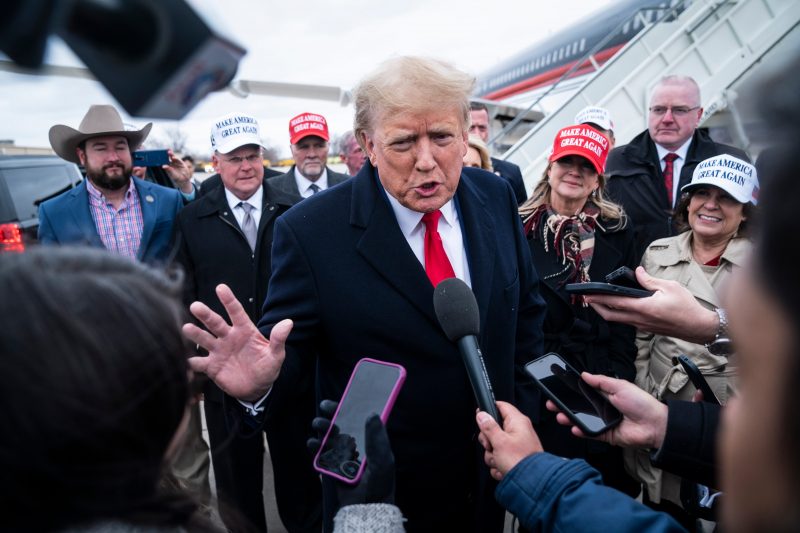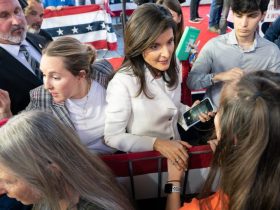DES MOINES — Matt Windschitl, the majority leader of the Iowa state House, said he wants a presidential candidate “focused on the future” and was concerned by former president Donald Trump’s openness to red flag laws for gun owners.
Steve Deace, an Iowa-based conservative talk show host with a large following in the state, said Trump’s recent criticism of a six-week abortion ban hurt his standing with evangelical voters.
And Sen. Joni Ernst (R-Iowa), who’s staying neutral in the 2024 presidential primary, observed that recent endorsements by Windschitl and other state lawmakers for Florida Gov. Ron DeSantis reflects a shift they sense among the voters they represent.
“I think he still has a really solid Republican base but Iowans have indicated that they are very interested in hearing from other candidates,” Ernst said of Trump. She added of the lawmakers who endorsed DeSantis, “I think they weighed it with their constituencies and just found it’s time to look at fresh blood.”
Although Trump has taken a commanding lead in national polls and many Republicans are calling him the inevitable nominee, here in Iowa, which will kick off the GOP nominating process next year, a victory is far from assured, according to interviews with local lawmakers, strategists and voters. Already, a slew of prominent Republican voices is challenging Trump and promoting DeSantis. Such support is highly coveted in a caucus that could be decided by a few thousand highly-engaged party activists — record turnout in 2016 was just under 187,000.
Trump and DeSantis will make competing trips to Iowa this week, beginning with DeSantis on Tuesday kicking off his first swing after officially announcing his candidacy last week. Trump will record a Fox News town hall in Clive on Thursday.
DeSantis’s nascent campaign is staking a major bet on the state. The super PAC backing him, Never Back Down, has been showering money and attention on Iowa, rounding up endorsements by state legislators, hiring experienced operatives, sending out flashy mail pieces, organizing events and starting to build a field operation.
Recent history has shown an Iowa win is far from determinative: The last three GOP winners in caucuses without an incumbent did not go on to be the party’s nominee, and Trump himself overcame a narrow loss in 2016 to win the nomination and the presidency. But in a race where there is pressure on non-Trump candidates to show early success against him, the state looms as a key test in 2024.
“There’s an opportunity for others to come out here, do it the old-fashioned way, the hard way, and work this state, press the flesh, look people in the eye — people are accustomed to that, they want that,” said David Oman, a longtime Republican adviser in the state who hasn’t picked a presidential candidate. “This could be a barnburner of a race. It’s not a laydown for Trump for sure at this point.”
Quality public polling on the Iowa race has been in short supply, but the Trump campaign is drawing confidence from research showing that voters who already have an opinion about Trump and DeSantis, including those who view both favorably, say they prefer Trump. They’re also trying to build a more professional ground game than the slapdash effort in 2016, when Sen. Ted Cruz (R-Texas) won Iowa.
“I understand everything they’re doing to try to make it into a competitive race, and we will fight as it as a competitive race to the end, but the challenges they face to bring the race into a competitive stature are much greater,” said Chris LaCivita, one of Trump’s top advisers. “Anyone underestimating President Trump’s willingness to campaign is making a huge mistake. People will see plenty of Donald Trump.”
Earlier this month, Trump and DeSantis had scheduled competing Iowa events on the same Saturday. But Trump’s plan for a mega-rally in Des Moines, with the campaign expecting at least 5,000 people, literally never got off the ground. Clear blue skies gave way to pouring rain, with a tornado watch in effect and an actual sighting in the vicinity.
Lawyers and pilots told Trump he couldn’t go, but he grew angry and demanded to go anyway, according to multiple aides. “He was not a happy camper,” said one close adviser, who spoke on the condition of anonymity to describe private conversations. DeSantis supporters expressed skepticism of Trump’s justifications for canceling as DeSantis added a stop nearby, reveling in the “beautiful” evening.
DeSantis advisers have told donors they view Iowa as especially promising for the governor, and DeSantis has said he plans to campaign in all 99 of the state’s counties.
A Never Back Down adviser, who like others spoke on the condition of anonymity to discuss strategy, said the group will build on lessons from Cruz’s 2016 Iowa operation. Both the super PAC and DeSantis’s political team are filled with Cruz alumni, including former campaign manager Jeff Roe and former campaign adviser David Polyansky, who also used to work for Ernst.
Cruz won Iowa with notable leads among evangelical Christians — who accounted for nearly two-thirds of Republican caucusgoers at the time — as well as “very conservative” voters. DeSantis’s Florida record has given him a résumé that could resonate with such Iowans, some Republicans said. Among the bills he recently signed was a six-week ban on abortions that the governor sometimes omits from speeches but noted but in Sioux Center this month.
Trump and his aides have touted his appointment of three conservative justices to the Supreme Court, paving the way for overturning Roe v. Wade. Still, Bob Vander Plaats, an influential Iowa evangelical who has been increasingly critical of Trump, said Trump has damaged himself in the state with his recent comments on abortion, where he suggested the issue dragged down Republicans in the 2022 midterms and dodged questions about a national ban. The Iowa Supreme Court is considering whether to allow a six-week ban to take effect, the same as DeSantis’s bill that Trump called “too harsh.”
“This will not go well for Trump, I don’t understand it, it’s bizarre for me,” said Deace, the talk show host who described his support as DeSantis’s to lose. “Pro-life people I talk to in Iowa and across the country say that dog ain’t gonna hunt, and it absolutely opens the door for a guy like DeSantis.”
In addition to evangelicals, Deace said a significant community of Iowa Republicans who oppose vaccines and hold Trump’s pandemic policies against him, which could endear them to DeSantis’s shift in opposition to covid shots.
DeSantis got a warm reception earlier this month in a heavily pro-Trump swath of rural Iowa, addressing a Sioux Center picnic where many voters said they were still weighing their options. Trump “gets himself in trouble,” said 93-year-old James Veldhuizen. On May 13, he went to hear DeSantis, his first choice.
Jeff Boeyink, an Iowa-based GOP strategist supporting DeSantis, compared the governor’s path to how Rep. Randy Feenstra (R-Iowa) beat Steve King, a longtime incumbent known for racist remarks. Feenstra worked to reassure voters in the deep-red district that they weren’t sacrificing conservative credentials, then closed with a message emphasizing effectiveness, Boeyink said.
“My only concern is too many candidates,” he said.
The Trump campaign is determined to out-organize its 2016 version, which centered on large events with almost no permanent infrastructure once Trump’s plane took off. The campaign says it plans to leverage supporter data from more than a dozen past events in the state, small-dollar donations and the more than 31,000 participants in the 2020 caucus, who overwhelmingly backed Trump.
“We know who those people are, we have an extensive field team, and we’re going to be reaching out to every single one,” said Alex Latcham, the campaign’s early state director. “We’re running a campaign that will leverage our best asset, which is President Trump and the enthusiasm people have for him.”
The Trump campaign plans to attack DeSantis’s past opposition to a federal biofuels mandate that supports production of ethanol, a major industry in Iowa, as well as his votes in Congress to cut Social Security and Medicare spending. (Trump’s White House budget proposals also included cuts to Social Security and Medicare programs.)
At a recent meeting of the Dallas County GOP, Trump fans were thrilled to hear of his plans to return to the state for smaller-scale events, while some DeSantis supporters in the crowd of 150 stayed more subdued, according to county chair Kelley Koch.
“I’ve been to so many Trump rallies and supported him but I want to talk to him, more than a handshake,” she said. “And I will.”
The Trump campaign has attacked DeSantis for outsourcing field operations to the super PAC, which is funded by unlimited donations, and for using paid door-knockers, including some from out of state, in contrast to the Trump team’s approach of using in-state volunteers. Never Back Down officials did not dispute that their canvassers are paid and said 189 have knocked on well over 30,000 doors in Iowa. Responding to criticism of door-knockers from other states, they pointed to canvassers’ involvement in local events such as Memorial Day Weekend flag-planting at cemeteries.
Iowa-based operative Eric Branstad, previously announced as part of the Trump campaign’s state leadership team, has stepped back from a paid role to protect his consulting business, he said, but he remains in touch with Trump and the team, as well as other candidates. His father, Terry Branstad, a former governor and Trump’s ambassador to China, has not made an endorsement for 2024; he did not respond to requests for comment.
“It’s not a crowning,” the younger Branstad said. “This is the Iowa caucus, you have to earn it.”
DeSantis’s endorsement rollout set off alarms and anger among Trump staff and allies, they said. The campaign countered with its own list of county-based leaders. But one prominent activist on the list, Margaret Stoldorf, told Fox News she was staying neutral. The campaign said her party post prevented her from taking sides; Stoldorf declined to comment.
Another name on the Trump list who backed out was Gary Leffler of West Des Moines, known for showing up at political events and Fourth of July parades with a flag-wrapped farm vehicle called the “Patriotic Tractor.” In recent years, he’s been an outspoken supporter of Trump, even traveling to Washington to protest the election results on Jan. 6, 2021.
But when Leffler saw how much money Never Back Down was spending in Iowa on behalf of DeSantis, he looked into parking his tractor in a different barn. He wants to get paid for his support, and said he tried negotiating a price with both camps, but has not gotten any deal.
“We don’t really look at it as a bidding war as much as my wife and I are praying and want to make sure we would feel comfortable in the direction,” Leffler, said in an interview. “We want to retire … We’ve been very upfront with both campaigns: we’re not doing it for free.”
Both the Trump campaign and Never Back Down have paid advisers in the state. Never Back Down spokeswoman Erin Perrine said none of the DeSantis endorsers it announces are paid. The Trump campaign announced leaders in all 99 counties, some of whom are paid.
DeSantis met with Iowa state lawmakers in March on his book tour and has called some personally to thank them for their support, legislators said. Never Back Down has been organizing the endorsements and starting in April, the group sought to snag lawmakers in person at the Iowa Capitol once some people were on board, the adviser to the group said; the night before the legislative session ended, in early May, they rented a room and invited people to come chat over pizza, soda and energy drinks.
Among 37 state legislative endorsements that Never Back Down announced were Windschitl; state Senate President Amy Sinclair; and a self-identified moderate, state Rep. Brent Siegrist, who voiced concern that nominating Trump could hurt other Republicans running in 2024.
Windschitl said he helped enlist colleagues in the legislature and has also started making DeSantis’s case to grass roots activists, who will wield influence in the caucuses.
“Is it gonna come back to bite me?” Windschitl said of his endorsement. “Absolutely. I’ve got some people in my district that are always-Trumpers, and they are going to dislike my endorsement of Governor DeSantis, but I’m not shying away from that fight in my own district.”
Sinclair framed her endorsement as a statement of support for DeSantis rather than any objection to the former president.
“Iowans are notoriously critical and notoriously politically engaged,” she said in an interview. “I think there are a lot of people who are open.”
Michael Scherer, Marianne LeVine and Emily Guskin contributed to this report.








